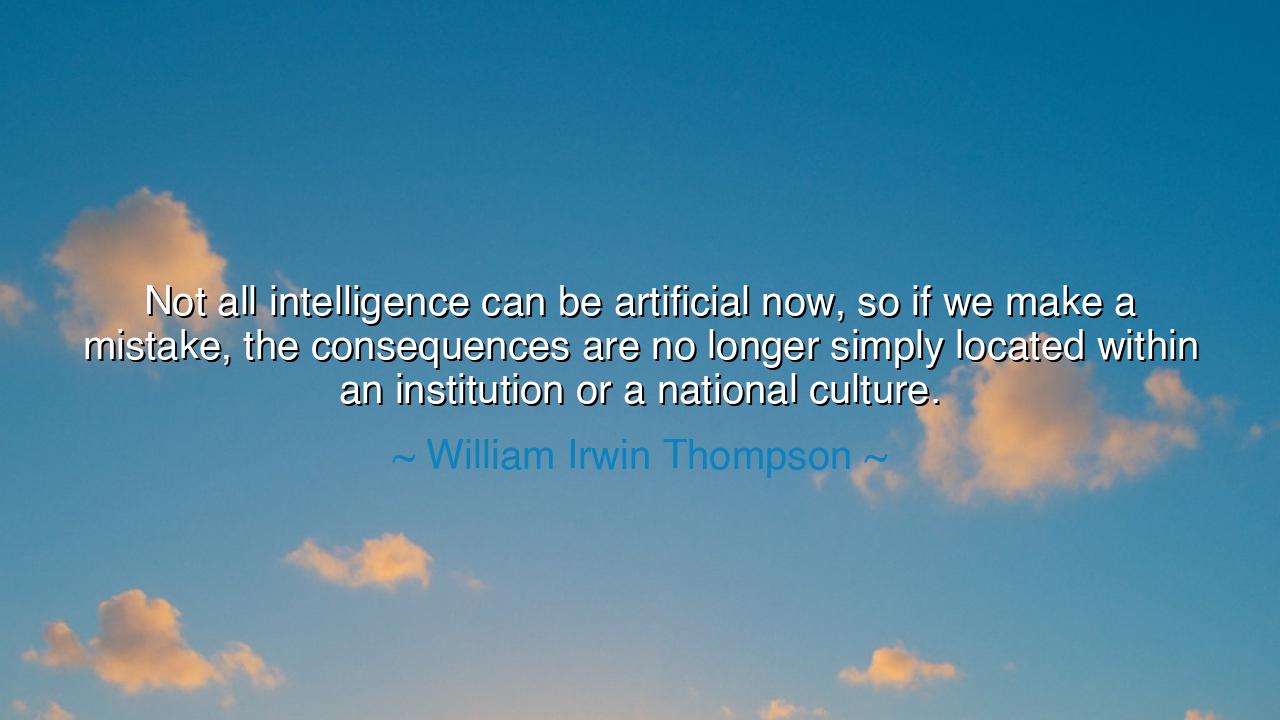
Not all intelligence can be artificial now, so if we make a
Not all intelligence can be artificial now, so if we make a mistake, the consequences are no longer simply located within an institution or a national culture.






“Not all intelligence can be artificial now, so if we make a mistake, the consequences are no longer simply located within an institution or a national culture.” Thus spoke William Irwin Thompson, the philosopher-poet who walked between the worlds of science, myth, and civilization. His words carry the solemn tone of a prophet gazing into the dawn of a new age — an age where human thought has given birth to machines that think, and where the boundaries between the natural and the artificial, the human and the mechanical, grow ever thinner. In this saying, Thompson does not merely speak of technology; he speaks of power and responsibility, of the sacred duty that comes when creation begins to mirror its creator.
For centuries, intelligence was the province of flesh and spirit, contained within tribes, cultures, and nations. The mistakes of a ruler, a priest, or a general could wound thousands, but the world remained divided by distance and time. Now, as Thompson foretold, we stand in a world where intelligence is no longer local, where it moves at the speed of light and crosses every border without permission. A single error in the design of an algorithm, a moment of carelessness in code, or a moral failure in the builders of machines can send ripples across the globe, shaping economies, beliefs, and even the fates of nations. The consequences of thought have become planetary.
Thompson’s insight arose in the latter half of the twentieth century, as computers began to awaken and the first digital networks began to pulse with the lifeblood of information. He saw before others that the world was not simply changing — it was metamorphosing. Intelligence was no longer confined to the human mind; it had begun to flow outward, into circuits, databases, and silicon architectures. The child of humanity — artificial intelligence — was being born, and with it came a transformation in the nature of responsibility. Once, a mistake was a human fault, confined to a person or a government. Now, a single misguided decision could alter the balance of the entire world.
Consider the story of Oppenheimer and the birth of the atomic bomb — a creation of human intelligence that transcended national boundaries the moment it existed. Though the Manhattan Project was American, its consequences belonged to all mankind. Oppenheimer himself, beholding the fire of his creation, remembered the words of the Bhagavad Gita: “Now I am become Death, the destroyer of worlds.” Thompson’s quote stands in the same lineage of thought, but for a new kind of power — not physical, but cognitive, informational, digital. The mind itself has become a weapon and a tool, and the consequences of its use, whether for harm or healing, are shared by the whole of humanity.
Thompson’s warning, then, is not merely cautionary — it is cosmic in its scope. He tells us that intelligence — whether human or artificial — must be bound by ethics, humility, and wisdom. For if our creations now act with the reach of gods, we must learn to think with the compassion of saints. The separation between nation and world, between private and public, between creator and creation, has dissolved. We are all interconnected, and therefore, all accountable. The mistakes of the few can become the suffering of the many, just as the wisdom of the few can become the salvation of all.
There is, too, a deeper spiritual truth in his words. Not all intelligence can be artificial — meaning, there remains within humanity a sacred spark, a wisdom that no machine can replicate. Machines may calculate, but they cannot feel wonder; they may analyze, but they cannot love. It is this living intelligence — born of empathy, imagination, and conscience — that must guide our inventions. For if we surrender this divine element to cold logic, we risk creating systems without soul — intelligence without understanding, knowledge without wisdom.
Therefore, O listener, take heed of Thompson’s message. In an age where intelligence transcends flesh, do not let your conscience grow mechanical. Think carefully about the tools you build and the truths you spread, for their echoes may circle the earth a thousandfold. Practice discernment in your learning and compassion in your creating. Let your intelligence remain human, your wisdom remain humble, and your heart remain whole. For the power that once lay in kings now lies in the hands of all — and to wield it rightly, we must remember what it means to be human amid the machines.
In this, the lesson of William Irwin Thompson endures: that the fate of intelligence, whether natural or artificial, will not be decided by technology, but by the moral evolution of the human spirit. As we shape the tools that think, we must also shape the souls that decide how they are used. Only then will we ensure that the brilliance of our creations becomes not our downfall, but our awakening.






AAdministratorAdministrator
Welcome, honored guests. Please leave a comment, we will respond soon